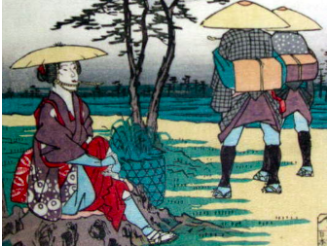Japan Foundation Graduate Student Research Accelerator Awards
The competitive Japan Foundation Graduate Student Research Accelerator Awards are designed for graduate student pilot research in preparation for longer-term PhD research or advanced intensive language training over the summer. The awards are matched by the UCSB Graduate Division. Graduate students selected for these prestigious awards will be noted as Japan Foundation/Graduate Division Research Accelerator Award recipients.
Evaluation
Award recipients are selected by a faculty committee of three faculty members from different departments, beginning in spring 2019.
Recipients (2021)
Erin Trumble (History)

In her dissertation project titled “Rebirth after Retirement: How Elderly Women Reinvented Femininity in Edo Japan,” Trumble will focus on women’s retirement to assess the creation and performance of gender. By centering retirement, she will explore the ways in which relinquishing duties and gaining freedoms allowed women to restructure and redefine feminine behaviors. Aided by a Japan Foundation/Graduate Division Research Accelerator Grant, Trumble will conduct preliminary archival research focusing on women’s prescriptive literature in order to understand how instructional texts advised women to behave, particularly during their retirement years.
Sabra Harris (East Asian Languages and Cultural Studies)

Harris’ project is entitled, “Embodying Kotan: Ainu Community and Creative Expression.” Using the frame of kotan, an Ainu word for village, this project seeks to challenge Indigenous place as fixed in the past or within geographical territory. Kotan is dynamic in the way it signifies “village” as both an ancestral place and a sense of community that people can build when no longer connected to traditional homeland (physically, or affectively as a result of colonial violence). Highlighting global flows and the central role of transnational interactions with Indigenous communities, the project seeks to critically explore the reshaping of kotan as it circulates in popular culture, museums, and in public-facing performances by Ainu people.
Nirupama Chandrasekhar (History)

Nirupama Chandrasekhar will conduct a series of multi-sited oral histories, in preparation for her dissertation project, “Defiant Indigeneity in the Okinawan Tourism Industry”. She aims to tease out how Okinawans who are affected by the tourism industry have felt about the increasingly precarious tourism situation, in the aftermath of Shuri Castle’s recent destruction and the COVID-19 outbreak. Her goal is to demonstrate how Okinawans, in acts of defiant indigeneity, preserve their culture through processes meant to commodify them, and in doing so, find ways of working against the colonial forces bearing down upon Okinawa. Aided by a Japan Foundation/Graduate Division Research Accelerator Award, Nirupama will be able to travel to Okinawa and meet many key interlocutors.
Felicity Stone-Richards (Political Science)

courtesy of Anadolu Agency
For her dissertation project, “The Search for Acknowledgment: Pro-Immigration and Anti-Racist Praxis in Japan,” Felicity will engage in comparative textual interpretation of Japanese and American political theory texts and manifestos, and research the understandings of theorists and essayists on the question of historic institutional oppression. She will combine this with ethnographic research of the organizational practices and philosophies of immigration advocacy groups and anti-racist activist groups in Japan. Aided by a Japan Foundation/UCSB Graduate Division Research Accelerator Award, she will spend eight weeks improving her Japanese language ability by attending the Middlebury Language School Japanese immersion program.
Recipients (2020)

Mariangela Carpinteri (Religious Studies)
Mariangela Carpinteri will conduct preparatory archival research for her dissertation project on the “Perception of Nature in the Edo Period”. She aims to clarify the role played by Onmyōdō, Neo-Confucianism (Sōmin rigaku) and Suika Shintō in the creation of the imaginary of nature in the pre-modern era of Japan. Her goal is to understand how the cosmic conceptions of nature concretely influenced the relationship between human beings and nature. Aided by a Japan Foundation/Graduate Division Research Accelerator Award, Carpinteri will be able to access to the archives of the main libraries in Tokyo and meet some of the experts of the Edo period.

Michael Ioannides (Anthropology)
For his dissertation project, “Cultural Revitalization through Indigenous-led Sustainable Development in Hokkaido,” Ioannides will use ethnographic methods to examine the relationship between Ainu-led environmental restoration, cultural revitalization, and anti-dam activism in Nibutani, Hokkaido. Aided by a Japan Foundation/UCSB Graduate Division Research Accelerator Award, he will spent ten weeks improving his Japanese language ability by attending the Inter-University Center’s intensive Japanese language summer program.

Yiming Ma (EALCS)
Ma is developing a dissertation project that examines the transnational literary and cultural history of Japan and China during the 1920s–1930s. A major part of this research will trace a loose underground network of Japanese and Chinese left wing intellectuals and artists whose publications were only available in Japan. Aided by a Japan Foundation/UCSB Graduate Division Research Accelerator Award, he will conduct research in Tokyo and Sapporo, visiting special archives and collections at universities and examining rare prewar journals and magazines. This will help Ma identify the key players and thinking that animated the transnational stories he will explore.

Kaitlyn Ugoretz (EALCS)
In her dissertation project on the globalization of Japanese religion entitled “World Wide Shinto,” Ugoretz investigates the contemporary development of a global Shinto network through the circulation of digital media, ritual material, and transnational interactions. Aided by a Japan Foundation/Graduate Division Research Accelerator Award during the summer of 2020, Ugoretz will conduct ten weeks of online ethnographic research on Shinto shrines’ and practitioners’ innovative use of digital technologies and the religious implications thereof in response to the 2020 global COVID-19 pandemic and social distancing under the project title, “Shinto in the Time of Coronavirus: Japanese Religion Online During A Global Pandemic.”
Recipients (2019)

Daigengna Duoer (Religious Studies)
Aided by a Japan Foundation/Graduate Division Research Accelerator Award during the summer of 2019, Duoer visited three major libraries and archives in Tokyo––the National Diet Library, the National Archives of Japan, and the Tōyō Bunko––to access, peruse, and take notes on Japanese sources on Inner Mongolia for her dissertation project. Her dissertation examines the role of Buddhism in the formation, deconstruction, and re-formation of Inner Mongolian political, ethnic, and religious identities in the early twentieth century, specifically from the fall of the Qing Empire in 1911 to the establishment of the People’s Republic of China in 1949.

Mason Johnson (Religious Studies)
For his dissertation project, Johnson examines the monk Chōgen’s (1121-1206) localized reception in the area of the former Suō province (present day Yamaguchi prefecture). Aided by a Japan Foundation/Graduate Division Research Accelerator Award, he researched at the city and provincial libraries of Hakata, Yamaguchi, and Kobe, and established connections with Buddhist priests and lay people at temples related to Chōgen’s cult, in addition to contacting local tourism boards and organizations in charge of local history and traditions.

Keita Moore (EALCS)
Moore is developing a dissertation project that considers the conditions of videogame textuality in Japan, and asks how these ludic media fit into socio-cultural ecologies of the lived everyday, and what role they play within larger mediascapes. Aided by a Japan Foundation/Graduate Division Research Accelerator Award, he spent seven weeks in Japan to survey and collect primary sources available only in Japan, establish contact with key players and institutions, and reviewed relevant source collections held by National Diet, Tokyo Metropolitan, and Meiji University Gendai Manga Libraries, as well as the Ōya Sōichi Bunko magazine library and the Japanese chapter of the Gēmu Hozon Kyōkai.

Kandra Polatis (History)
In her dissertation project on “Death and the Diseased Colonial Body,” Polatis aims to show that burial practices constituted a vital part of discursive endeavors to enact “scientific colonialism” and that in the process of creating modern, hygienic, and therefore “civilized” subjects of Japan, physicians and colonial authorities paid as much attention to the dead as to the living. Aided by a Japan Foundation/Graduate Division Research Accelerator Award, Polatis was able to conduct transnational research in Tokyo and Taipei in order to better understand the differences in the processes of epidemic control and burials in both locations.